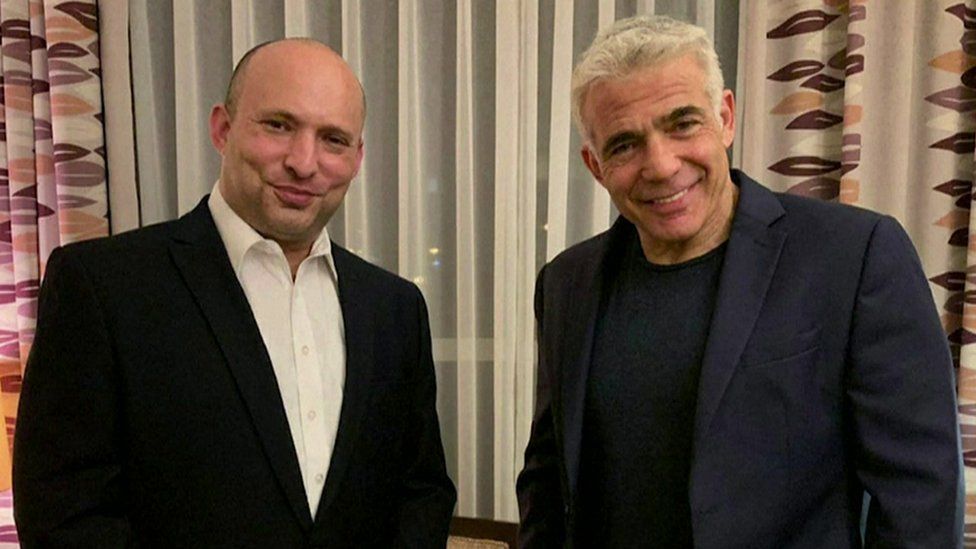Israel’s Benjamin Netanyahu has lashed out at a newly agreed coalition which looks set to remove him from power after 12 years as prime minister.
Mr Netanyahu called on right-wing members of parliament to block the coalition from taking office.
Eight parties reached an agreement to work together to form a new government late on Wednesday.
But the group, from across Israel’s political spectrum, still needs parliamentary backing to take office.
No date has so far been set for such a vote in the Knesset (parliament). But it is expected to take place next week at the latest, and there is still a chance this newly formed coalition could be upended by defections.
In his first comments since the coalition was announced, Mr Netanyahu urged members of the Knesset “elected by votes from the right” to oppose the coalition.

In a post on Twitter, he criticised them as “left-wing” and “dangerous”. He has previously called the proposed new government the “fraud of the century”, saying it endangered the state and people of Israel.
Observers have already noted that Mr Netanyahu – who failed to form his own coalition despite his Likud party winning the most seats in the March vote – is likely to try to prevent the group getting the support it needs.
News of a fresh coalition emerged late on Wednesday, when Yair Lapid, leader of the centrist Yesh Atid party, called President Reuven Rivlin to let him know that agreement had been reached.
He pledged to form a government which would “work in the service of all Israeli citizens… respect its opponents and do everything in its power to unite and connect all parts of Israeli society”.

However, Mr Lapid will not become prime minister immediately. Under a rotation arrangement, the head of the right-wing Yamina party, Naftali Bennett, would serve as prime minister first before handing over to Mr Lapid in August 2023.
The coalition members span the full spectrum of Israeli politics with little in common apart from their plan to replace Mr Netanyahu. For the first time in decades, the government will include an Israeli Arab party.
An image carried on Israeli media showed Mr Lapid, Mr Bennett and Mansour Abbas, leader of the Arab Islamist Raam party, signing the agreement, a deal many thought impossible.
Whatever happens tonight and in the days left until the confidence vote if it ever takes place, this is a historic photo. A leader of an Arab-Israeli party and the leaders of a Jewish-nationalist party signing an agreement to join a government together pic.twitter.com/ahGijY6qgc
— Anshel Pfeffer אנשיל פפר (@AnshelPfeffer) June 2, 2021
Mazzaltov World News is not responsible for the content of external sites.View original tweet on Twitter
The other five parties included in the agreement are:
- Kahol Lavan (Blue and White) (centrist) – led by Benny Gantz (eight)
- Israel Beiteinu (centre-right to right-wing nationalist) – led by Avigdor Lieberman (seven)
- Labor (social-democratic) – led by Merav Michaeli (seven)
- New Hope (centre-right to right-wing)- led by Gideon Sa’ar (six)
- Meretz (left-wing, social-democratic) – led by Nitzan Horowitz (six)
If the coalition fails to win the support of a majority in the 120-seat Knesset, there is a risk of a fifth election in two years. All eight parties were needed to secure the 61-seat majority.